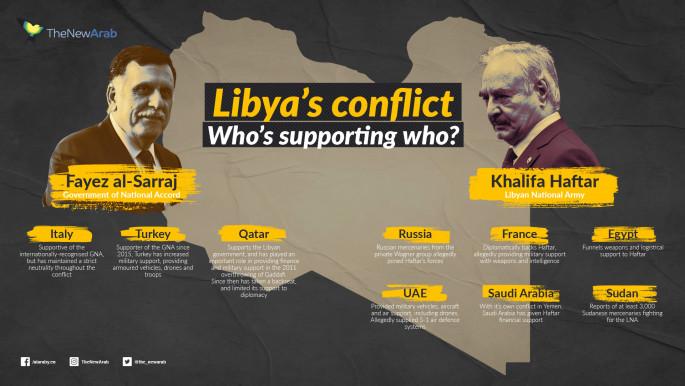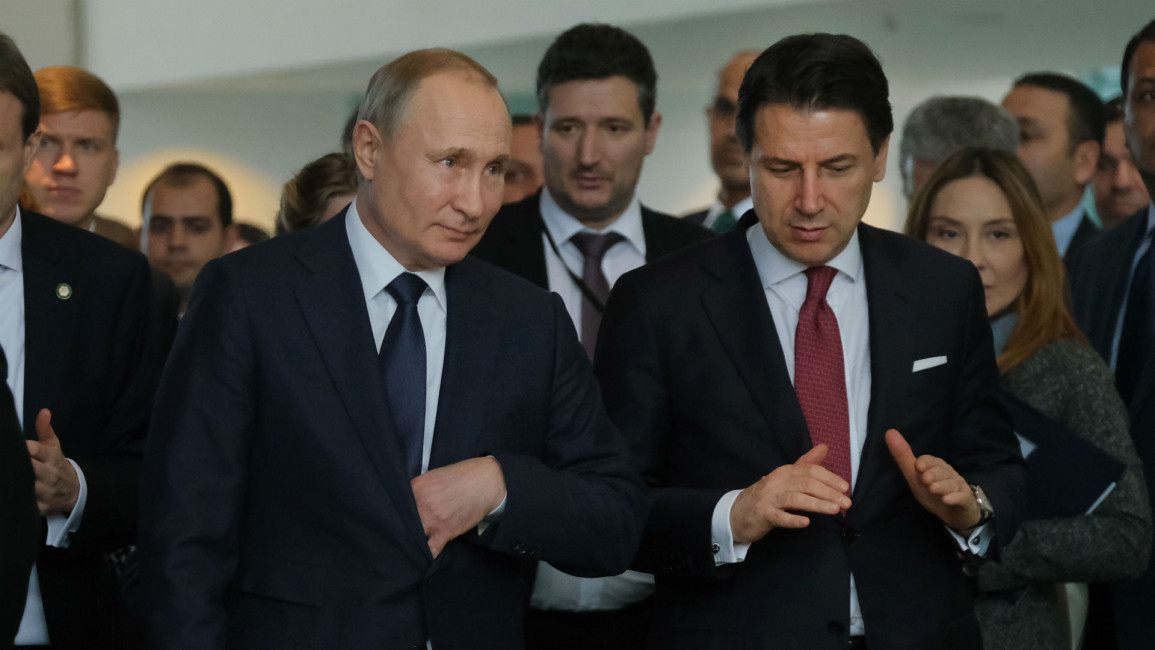
Libya has been flooded with mercenaries and private military companies
Increasingly, it resembles a real life version of Abbot and Costello's Who's on First comedy routine.
Since last fall, Russia's Wagner Group has been supporting renegade General Khalifa Haftar's Libyan National Army, which is bankrolled by both Saudi Arabia and the UAE - the same countries that are using mercenaries and PMCs in Yemen - as well as France, Egypt, and Jordan.
Russia's main goal is to secure port and energy access, regardless of how many Libyans have to die to accomplish it. Russia has reportedly flown hundreds of fighters to Libya, most likely via Cham Wings airlines from Damascus to Benghazi. Wagner fighters have reportedly supported Haftar's assault on the Libyan capitol of Tripoli.
It is no secret why Russia uses companies like Wagner. Using PMCs allows Putin to lower the political costs of achieving his goals in North Africa. Using such groups avoids the political scrutiny that comes with the deployment of conventional armed forces. When PMCs increase Russia's prestige abroad, the state can acknowledge and take credit for their actions; when they do not, the state can distance themselves.
Over 30 Russians have died fighting there. The first of those casualties started arriving back in Russia last fall. As a reflection of the sensitivity surrounding those killed, neither the Russian government nor Wagner itself has formally notified the families of any combat deaths. This is contrary to Wagner's typical practice, which is to send death certificates and any military decorations to the relatives of combatants who are killed.
Twitter Post
|
Last month it was reported that Russian contractors fighting in Libya and Syria had received treatment at an elite St. Petersburg hospital owned by individuals close to Putin.
According to analysis by the Washington Institute for Near East Policy, Wagner's forces include drone jamming capabilities and snipers on the frontlines who have killed forces associated with the Government of National Accord (GNA), as Libya's internationally recognised government is known.
The analysis also notes that Wagner poses command and control problems:
Their behaviour does not fit within standard western military definitions. Their activities overlap between contractors, mercenaries, and other categories - there is no clear separation between military and private like one sees in the west. There is also no clear policy or legal framework for Moscow's actions; technically, PMCs are illegal even under Russian law.
One must also keep in mind that Russian PMCs are not entirely controlled by Putin - the interests of the various cronies and oligarchs in his circle can differ from his own, since they are chiefly interested in money. For instance, Yevgeny Prigozhin, owner of the Wagner PMC firm, is mainly focused on Libya's energy resources.
Last month, it was reported that two other Russian companies, including Moran Security Group, have joined Wagner in supply mercenaries to fight in Libya.
Russia has been coy about Wagner in Libya. President Putin recently said, "If there are Russian citizens there, they do not represent the interests of the Russian state and do not receive money from the Russian state." But, Wagner is, at least theoretically, considered a private military company acting at its own peril and risk, and also at its own interest. So officially it is not representing the Russian state.
The presence of Wagner has made some difference on the battlefield, causing the Libyan government to rely even more on Turkey, its only foreign military sponsor. Just like Russia, Turkey also has economic motives. Ankara signed a deal in November with the GNA that gives it exploration rights to offshore oil and gas fields in the Mediterranean.
Turkey, as part of its support for the GNA, has reportedly sent at least 2,000 fighters mainly from the Free Syria Army (FSA), from Syria to Libya to join pro-government forces. The FSA is reportedly paying a salary of US$2,000 a month to each fighter. The FSA is reportedly not just sending fighters but also civilians who are poor and willing to go. The Turkish mercenaries have also suffered casualties.
 |
|
| [Click to enlarge] |
Last December it was reported that Pro-Turkey armed factions in northern Syria opened four centres in the city of Afrin to attract militants to register and to go to Libya.
Ironically, Abdel Hakim Belhadj, now a Libyan politician and military leader, but formerly head of the Libyan Islamic Fighting Group, which was banned worldwide as an affiliate of al-Qaeda, is reportedly helping Turkey send fighters to Libya, primarily flying fighters into Libya from Turkey, via the Libyan Wings Aviation Company.
But Syrians are hardly the only fighters to be imported. Recently, Sudanese protested in Khartoum, "alleging that their relatives had been recruited by UAE firm Black Shield as security guards but were despatched to war-zones in Libya and Yemen."
This has actually been going on for some time. The United Nations said in a December report that five Sudanese and four Chadian armed groups had contributed thousands of combatants to fight in Libya.
Read more: Berlin Conference: Breakthrough for Libya, or more of the same?
A separate UN report on Sudan released in January also found that many Arabs from the conflict-wracked region of Darfur were fighting as "individual mercenaries" alongside Libyan warring parties.
Although it is difficult to be definitive about all the African mercenaries, most of them seem to be supporting Haftar.
Some think that their involvement could be destabilising for their home countries in the future. An article published last December by Turkish state-backed international news outlet TRT World noted, "Years ago, officials in Khartoum raised the alarm over the Minnawi faction of the Sudan Liberation Movement's participation in Libya's conflict because of concerns about what this group could potentially do after returning to Darfur."
David Isenberg is an independent researcher and writer on U.S. military, foreign policy, and national and international security issues.
This article was originally published by our friends at Responsible Statecraft.
Join the conversation: @The_NewArab
Opinions expressed in this article remain those of the author and do not necessarily represent those of The New Arab, its editorial board or staff.




